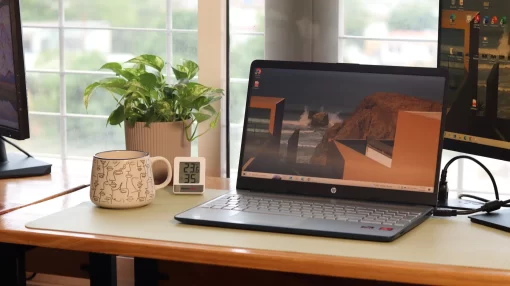Nowadays, the concept of work has undergone significant changes. Technological advancements and internet access allow you to work anywhere and anytime. While this presents a considerable advantage regarding flexibility and the freedom to work from home, it has also blurred the lines between professional and personal life for many remote workers. As a result, these individuals often struggle to maintain a healthy work-life balance.
Gallup, a global analytics and advice firm, reports that most Americans continue to work after their regular hours or at home, as stated in their article “Most U.S. Workers See Upside to Staying Connected to Work.“
Many employees complete unfinished tasks or respond to emails and calls beyond their shift hours. There is no set limit, and this often leads to working for extended periods without realizing the negative impact it can have in the long run.
How to Set Healthy Boundaries As a Freelancer
When you are a freelancer, and your work is not subject to a schedule or physical space, the line that separates work from personal life may be non-existent or so blurred that it’s easily crossed. That’s why freelancers are the most likely to have high levels of anxiety, stress, and even depression.

However, there are ways to set healthy limits and help keep stress levels at bay, such as adopting a work style that favors balance.
When I say “balance,” I don’t mean splitting your time into precise hours for each task. This method may work for some people, but it doesn’t work for everyone.
I mean that you should prioritize your health and productivity by finding a healthy work-life balance that works best for you. Since everyone is unique, there are various ways to achieve this balance. Let me share some tips on establishing boundaries to help you achieve this.
Separator, integrator, or cycler?
In the article “Managing Work Life in the Digital Age,” Ellen Kossek wrote about different boundary settings, suggesting there are three main types:
- The separator or segmentor
- The integrator
- The cycler
A segmentor or separator segments certain hours of the day for specific tasks, following the traditional concept of a work-life balanced routine.
An integrator is someone who manages work and personal life tasks throughout the day, blending them while trying to be 100% concentrated in both places at different moments.
A cycler works all hours for a season and then has time off in the next one. Although this kind of entrepreneur is uncommon in the freelance business, it is most likely to be found in jobs that tend to fall in season. For example, a farmer works non-stop during harvest and then has a heavy time off.
Whether you’re a separator or an integrator, here are three tips for setting healthy boundaries between your personal life and your job during this inevitable Work From Home time.
Balancing Working Hours
For Segmentors
As a segmentor, you will probably find comfort in establishing specific routines to distribute your time and work hours according to your assigned tasks. When working at the office, setting limits and hours is very easy. However, when you work from home, you struggle with work-life balance.
To enjoy a healthier lifestyle, you need to learn to separate your personal life from your work responsibilities.
Establishing a specific work schedule can help you organize and feel in control of your time, but be prepared to modify your list in case of any eventuality or change. When working from home, many factors, such as family members or distractions, can interfere with your usual working schedule.
It’s good to reach an agreement with the people who live with us to help each other with chores or other tasks. Or if you live alone, settle down the way of accomplishing all your other responsibilities to ensure your well-being and productivity.
Once this schedule is established, you must be constantly determined to maintain it.
For Integrators
On the other hand, if you are an integrator, it may not be necessary to establish a strict agenda. However, if you’re working from home, it will be even more difficult to balance the time you invest in your job and the time you invest in your personal life.
For this reason, you should establish limits to guarantee your focus on each task. For example, try using the Pomodoro Technique when you have to work.
Focus entirely on your work, be productive for at least twenty-five consecutive minutes, take five-minute breaks to clear your mind, check your social media chat with a family member, and then return to your work rhythm.
While you’re having free time, try dedicating yourself to enjoying this time, alone or in the company, but disconnect from work and your responsibilities for some hours. The limits between one thing and the other can help you to be more productive and, at the same time, to rest.
Creating a Space That Favors Work-life Balance
It doesn’t matter if you are a segmentor, or an integrator, separating your work area from the place where you take a nap or where you eat, is going to help you get things done more efficiently.
It’s important to establish limits. Even if you don’t notice it, unconsciously, your mind associates certain places and specific environments with certain states of mind through what it has learned by association during your life. So it’s usual that if you try to work lying in your bed, you won’t be as productive as sitting at a desk where the only thing you’ve done is work.
This is a very subjective matter, and most integrators can be perfectly productive working in a home environment. Despite this, you should still designate spaces for everything and train your mind to associate these environments with work time.
So you can leave the productivity and creativity for that old desk you haven’t used since High School and sleep and leisure time in your bed or living room.
Whether you have a home office or have your computer and stationery on a desk, separate your workspace from your leisure space. Some people even recommend dressing appropriately for work, even while at home. This helps you visualize yourself in the workplace and focus on this role.
Respect Your Boundaries
You need to know when you’ve had enough work for the day and stop to take care of your needs. For example, setting a daily deadline for your work hours is an excellent way to prevent working over hours from harming your physical and mental health.
Many people have 10:00 p.m. as their deadline. At this time, they close their computers, move away from their cell phone, seek to settle down, and relax into sleep.
Set a time limit that suits you, depending on your work schedule and what you do. The important thing is that your time to work and your leisure time are defined so that you can fully dedicate yourself to each of them.
Your Health is Important
Bad sleeping or bad eating habits are common in remote workers. However, that doesn’t mean it’s okay. You need to eat correctly and have eight hours of sleep. You cannot ask your mind to be productive when you haven’t satisfied your body’s physiological needs.
So, by depriving yourself of this, instead of being more productive, you are undermining your health and, therefore, going against your development as a professional. You better work smarter than more complicated. Always ensure your well-being.
Balance must be present in every space of your life, especially work-life balance. So, even if you prefer clear limits between professional and personal life or are looking to integrate both sides, the important thing is that you know how to invest your time and energy healthily, taking care of your mind and body and complying with your other responsibilities.
Remember that, even more, as a freelancer, your success depends on yourself. You are your accountant and manager, and you must also be your caregiver. Don’t work your way to success at the expense of your mental well-being; on the contrary, find the right work-life balance.
See more articles by Andrea Corona.






